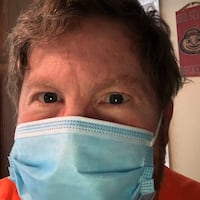The 10-foot-tall artwork depicts the Biblical depiction of life being blown into humankind, “so covering that, and making it inaccessible — having that black fabric draped over the iconic piece in the beautiful location that is the Walled Garden, we thought that would be fitting,” said Gabi Roach, the park’s arts & programming manager.
The exhibit will let viewers contemplate the many lives ended prematurely, Roach said.
Linda Seiter, executive director of the organization Caracole, which helps HIV patients in Butler and Warren counties, and elsewhere in southwest Ohio, remembers “the really scary, lonely time” during the early days of the AIDS epidemic. She knew several area artists from the region killed by it.
“I just think how sad it is, and what a loss to the world,” she said. “What a hole that is left.”
Get tested, she urges
“Get tested,” Seiter urges anyone at risk of having HIV (human immunodeficiency virus), which if not treated can lead to acquired immunodeficiency syndrome (AIDS).
“If you test positive, don’t assume that there isn’t help out there, or that the medication and treatment are unaffordable. We will help you with that,” Seiter added.
“People are definitely living longer because of the medications,” Seiter said. “However, there are some people that think they can’t afford the medications because of the cost.”
Many with HIV don’t get the medical services and prescriptions they need because, “They’re ashamed of contracting HIV,” Seiter said.
“We see people who live with this horrible, unnecessary burden, who may test positive 8-10 years ago, and then needlessly get sick before they come back to us, and in some cases don’t even tell their families, their friends,” Seiter said. “In some ways, the stigma related to HIV is not that much better than it was years ago, when we had the first World AIDS Day (in 1988), unfortunately.”
It’s not true people can’t afford HIV medications, Seiter said: “Anyone who enrolls in our services gets the medication they need, regardless of their income or their ability to pay. There’s always a way to get the medication.”
Caracole helps people in Butler, Warren, Hamilton and Clermont counties, plus others, who have HIV afford housing. It also provides case managers to help patients with medical appointments and medications they need, including with transportation. Its other mission is to prevent HIV.
HIV medicines developed during the 1990s still work and have been reformulated to be better, with fewer side effects, she said.
“All the advances in medication are fantastic, but if someone is living in poverty,” or feels the stigma of HIV, or lacks transportation, “all these advances are not necessarily accessible to them. That’s where we come in.”
The best way to contact Caracole is through its website, www.caracole.org.
Pyramid Hill’s 25th anniversary
“We thought this would be a great way to engage the collection, as well as engage our patrons and try to bring some awareness to the day, as well as show how well Pyramid Hill has done over the past 25 years with our mission of bringing people to art and nature,” Roach said.
Pyramid Hill also wanted to use the day to launch a 13-month celebration throughout 2022 of the park’s 25th anniversary year. The park’s founding date was Sept. 25, 1997.
Admission to the park is $8 for adults and $3 for children (ages 6 – 12). For more information, visit: www.pyramidhill.org.
AIDS is more rampant in many other parts of the world than here. UNAIDS released a statement before this year’s World AIDS Day warning that, “if leaders fail to tackle inequalities the world could face 7.7 million AIDS-related deaths over the next 10 years,” and if the disease continues at 2019 rates, and they will miss the goal of ending AIDS by 2030.
About the Author
